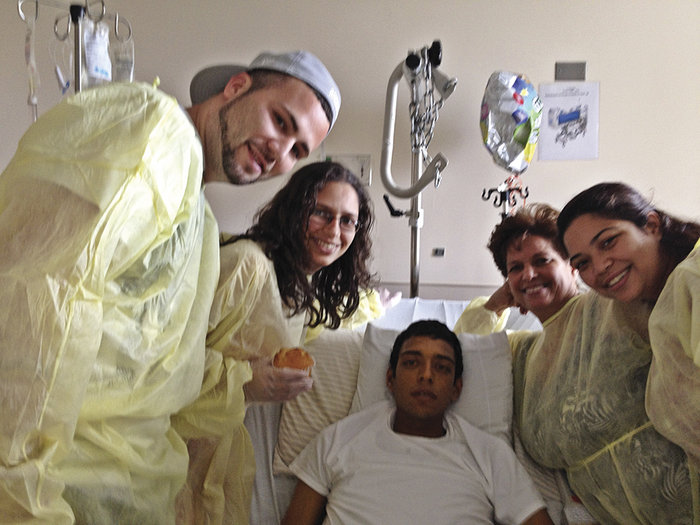Rene Rodriguez is the definition of a fighter. A young 26, he was discharged from University Hospital in Newark on Aug. 13 after receiving his second liver transplant.
Aside from being a little thin at his discharge with only 124 pounds on his 6’1” frame, Rodriguez – who gave an interview in his Union City home last week – was all hope with a witty, intelligent sense of humor, and big, smiling eyes. One would never guess he’d been in and out of hospitals fighting the complications of Hepatitis B since birth.
Rodriguez contracted Hepatitis B from his mother’s breastmilk after she contracted it during a hospital visit in the 1980s; a time when not much was known about the disease and hygiene standards were below what they are now. After he underwent 10 years of maintenance check-ups, the disease attacked his liver, and he developed tumors and cirrhosis.
Last week, he displayed a photo montage he’d put together of his latest ordeal. His first photo showed him at his healthiest shortly before things went downhill and his body rejected the transplant he received when he was 13. A second photo was taken right before he was admitted to the hospital, and a third showed Rodriguez surrounded by family after his transplant.
The final photo in the montage was of Rodriguez sitting in a chair at his home, smiling and well into his recovery, with “700 percent” inscribed at the bottom.
“That’s my thing,” he said. “I never do anything 100 percent. It’s always 700.”
Growing up with Hepatitis B
Only an incredibly positive attitude and gusto for life could have gotten Rodriguez through what can only be termed a battle to stay alive.
When he was first diagnosed with tumors as a child, he received chemotherapy. The treatment required him to be home-schooled for a year, and tired him out. He had to give up his beloved baseball, but he kept up with his classmates despite his illness.
The chemo didn’t work, and Rodriguez was told he had developed cirrhosis – a common complication of Hepatitis B – and that he needed a transplant at age 13.
“At this point I broke down,” he recalled. “I had wanted to get into the majors and at 13, that was my biggest disappointment. I’ve always been active despite my diagnosis, and I just wanted to get back to school.”
“I never do anything 100 percent. It’s always 700.” – Rene Rodriguez
____________
“I wasn’t going to let it get me down,” he explained. “If I was going to recuperate, I was going to recuperate at my own rate.”
The fight for the right to live
Though Rodriguez’s recovery was quick, a transplant patient must be closely monitored with consistent doctor’s care and check-ups and medications to be sure the body doesn’t reject the foreign organ. After he graduated from high school and experienced no medical complications, he lost his medical coverage.
He and his family attempted to keep up with the mounting bills from his necessary appointments, but a few times he was forced to skip visits because he could not pay.
Last February, he had several ruptured esophageal varices (veins) caused by his liver that had begun to show signs of being rejected. Doctors told him he would require another transplant.
On July 9, 2012, he was admitted to the emergency room. Doctors said they were surprised he wasn’t in a coma, given the severity of his illness. He needed a new liver immediately. However, without health insurance, they told Rodriguez they could not operate.
With time running out, his mother reached out to local politicians and family with government connections and they finally got Rodriguez on Medicaid. But his fight was not over.
The transplant board, who decides which patients’ cases are most urgent, was skeptical of Rodriguez because of the appointments he missed, he said.
“They thought I wasn’t taking care of myself,” he said. “Half the board thought I should get the transplant, and half didn’t. All of the hospital staff was rooting for me as they tried to decide essentially whether I deserved to live.”
On Aug. 1, the decision was made. Rodriguez received his transplant that day, and consistent with his fighting spirit, he again made a remarkably quick recovery.
The importance of being a donor
Beyond the need to maneuver the complex logistics of the medical system, transplant recipients must also find the right organ so that the body does not reject it. Lenard Freeman of the N.J. Sharing Network – a nonprofit organization responsible for the recovery of organs in North and Central Jersey – said that there are fewer Hispanic registered donors than there are in other demographics.
But there’s hope, Freeman said. The number of Hispanic drivers who check off the organ donor box on their licenses has increased over the past year thanks in part to his organization’s mission to educate the community and emphasize the need for and gift of becoming an organ donor.
“Unfortunately, there are many myths and misconceptions surrounding organ donation,” Freeman explained. “When we dispel those myths and help people to understand the facts, they are more able to make a more informed decision. Because of organ donors, patients who are days or even hours away from death can go back to leading healthy and productive lives.”
Rodriguez is a perfect example.
“I feel good, and I’m anxious to get out of these four walls,” Rodriguez laughed. He has plans to take the credits he earned during his year in college and return to school for criminal justice.
“700 percent,” he said, smiling.
For more information on the N.J. Sharing Network, visit www.njsharingnetwork.org.
Gennarose Pope may be reached at gpope@hudsonreporter.com
